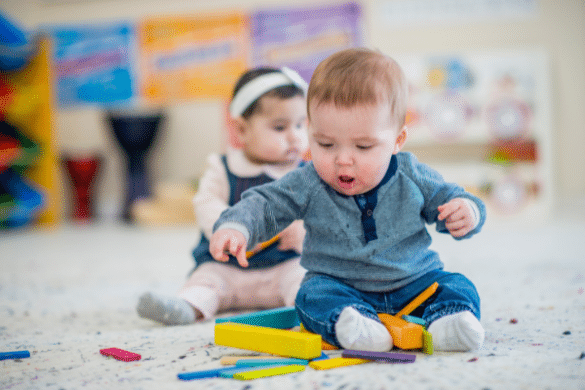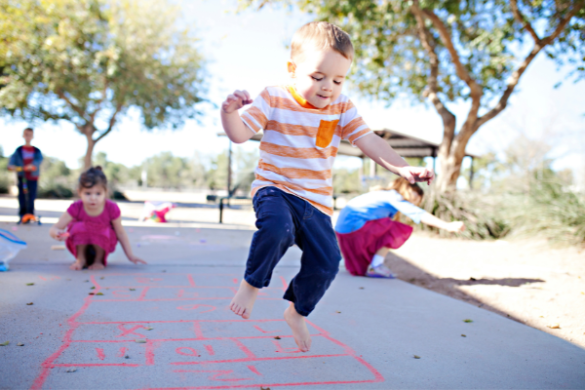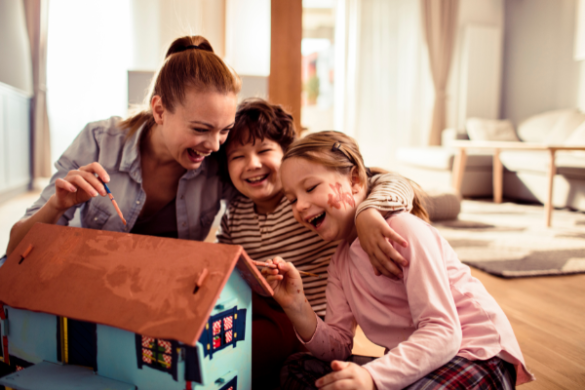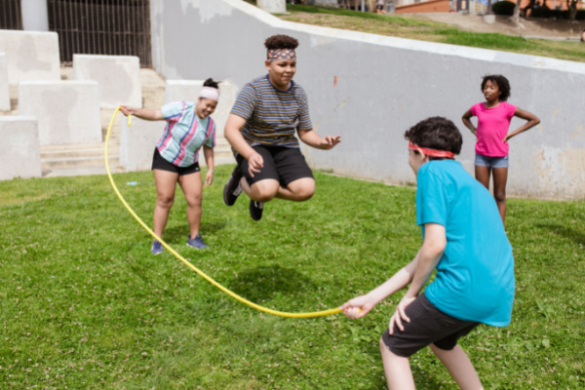Adulting is hard work. Our lives are filled with to-do lists, obligations, piles of laundry and deadlines. When you have kids, your house is rarely clean and you’re always only a few hours away from preparing and cleaning up after another meal.
What’s more, your kids start to have obligations of their own, which routinely involve you and further add to your workload. Yes, we’re looking at you: drop-offs, pick-ups, training and homework.
Amidst everything we “have to do”, it’s challenging to find time just to play.
It is, however, the easiest and possibly strongest way to connect with our children, not to mention good for our stress levels and souls!
But enough about us parents. Much research has been done- on babies through to teenagers- to identify how play benefits our children at every age.
We’ve summarised the findings below and believe they make a compelling argument to stop, step away from your laptop and spend a few extra minutes each day playing with your kids, no matter how old they are.
Under 12 months old
Benefits of play
In babies, play helps to:
- Develop language skills
- Strengthen memory and associations
- Physical strength
- Build imitation skills, which contribute to acquiring new movements and words, and better communication skills.
What to play
Games that support positive development include:
- All forms of sensory play.
- Pretend play eg. acting out eating and drinking.
- Having a “conversation” by mimicking your baby’s noises.
- Putting your baby in different positions (including tummy time) so that they can view their surrounding from different angles.
- Free play, where your baby is given different objects to explore, while given only minimal supervision.
Click here for more play ideas for babies under 12 months old.
1-3 years old
Benefits of play
The importance of play in childhood development is perhaps most evident in this age group. Toddlers and younger preschoolers are busy learning about all new sorts of play and how to get along with others. The skills they form through play at this age will be key to developing vital school-readiness skills.
In 1-3-year-olds, play helps children to:
- Build important social skills
- Develop coordination and gross motor skills
- Introduce musical concepts
- Broaden children’s imaginations and enhance creativity
- Grasp new concepts and acquire new information
What to play
Games that support positive development include:
- Pretend play eg. acting out scenes in different environments/situations where your child takes on a new role
- Musical play eg. singing and tapping out rhythms
- Creative play eg. offering materials like blocks, Duplo and mixed boxes of recycled craft materials they can use to imagine and build new creations
- Body movement eg. unstructured dancing, jumping and balancing activities
- Peer play eg. encouraging them to do any of the above with a friend of a similar age
Click here for more play ideas for 1-3-year-olds
4-5 years old
Benefits of play
Children between the ages of 4-5 are beginning to start school. While the school environment will introduce them to some new forms of play, such as child yoga, play skills must also be honed at home, because it is not recommended for children of this age to spend more than two hours per day on screens. Excessive screen time has been repeatedly linked to difficulties focusing, lower executive functioning skills and self-worth, and poorer physical and mental health.
“The literature is clear: Diverse strategies that combine play and more structured efforts are effective accelerators of children’s readiness for school and long term development” (Kagan & Lowenstein, 2013)
In 4-5-year-olds, play helps children to:
- Develop social skills, cooperation and emotional intelligence
- Enhance creativity
Physical play, in particular, also helps children to:
- Improve coordination and gross motor skills
- Build strength and physical endurance
- Improve body composition (in contrast to sedentary behaviours like watching TV).
What to play
Games that support positive development include:
- Pretend play eg. experiment with being different characters in different places and taking on different identities
- Musical play eg. singing and dancing, often in groups
- Creative play eg. offering materials like blocks, Duplo and mixed boxes of recycled craft materials they can use to imagine and build new creations
- Body movement eg. hopping, skipping, swinging, climbing and trampolining
- Peer play eg. encouraging them to do any of the above with a friend of a similar age.
Click here for more play ideas for 4-5-year-olds.
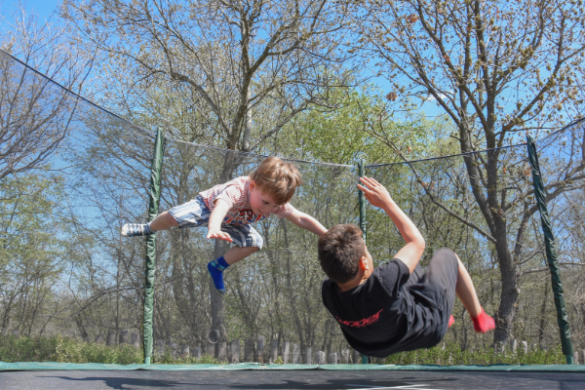
6-8 years old
Benefits of play
Beyond age five, most research focuses on the benefits of structured after-school activities and organised physical activity. We recently shared an article exploring the benefits of extra-curricular activities, but this is far from the only kind of play that 6-8-year-olds engages in. Unstructured play, both on the playground and at home, remains critical for this age group.
In 6-8 -year-olds play helps children to:
- Navigate social groups and etiquette
- Engage in problem-solving and strategic thinking
- Improve strength, fitness and body composition
- Develop confidence and a stronger self-concept
- Regulate their emotions
- Increasing memory and concentration
What to play
Games that support positive development include:
- Body movement eg. tips, swimming, playing chalk games, handball, skipping games
- Pretend play eg. assuming roles of TV/game characters
- Creative play eg. building cubbies and forts, playing with toys, holding a puppet show
- Peer play. By this age most forms of play are done in small groups.
Click here for more play ideas for 6-8-year-olds.
9-12 years old
Benefits of play
By nine, your children have likely outgrown many of the games they used to love. Your suggestions might be met with “That’s boring” or “That’s babyish”. You may need to start thinking of play along the lines of active and creative pursuits you can do with your child rather than games you can play. The benefits continue to be as important as ever for tweens.
In 9-12-year-olds play helps children to:
- Practise and improve skills
- Strengthen attachments with friends and parents
- Balance their moods and moderate their behaviours
- Increase their focus and attention to detail
- Enhance planning abilities and improve executive functioning.
What to play
Games that support positive development include:
- Body movement eg. tips, swimming, chalk games, handball, skipping games
- Pretend play eg. assuming roles of TV/game characters
- Creative play eg. building cubbies and forts, playing with toys, hold a puppet show, make a comic
- Peer play. By this age, most play happens within pairs or small groups.
Click here for more play ideas for 9-12-year-olds
13-17 years old
Benefits of play
Teenagers are notoriously hard to “play” with and most often spend time with friends during their teenage years. However, fostering a solid relationship with your child up until this point should still enable you to connect with them through their interests during unstructured leisure time.
In 13-17-year-olds play helps teens to:
- Strengthen their identity formation
- Regulate their moods and build resilience
- Help relieve stress
- Increase precision
- Express themselves in a safe space
- Manage anxiety and adversity
- Continue to build planning abilities and improve executive functioning.
What to play
Games that support positive development include:
- Body movement eg. bushwalks, swimming, bike rides, kicking a ball around, going to a skatepark, casual games of tennis, basketball or golf.
- Creative play eg. build something together (like a bird house, street library or vege garden), trial new recipes, make photo books, paint on easels or make a movie.
- Brain-building play eg. do puzzles together (jigsaws, crosswords etc), play cards, checkers/chess or other board games.
Click here for more ways you can connect with your 13-17-year-olds.

We hope you can use some of these ideas to bond with your children in ways they will remember and cherish even when they have children of their own.
For even more ways to play with young children, check out our guide to play with a purpose

